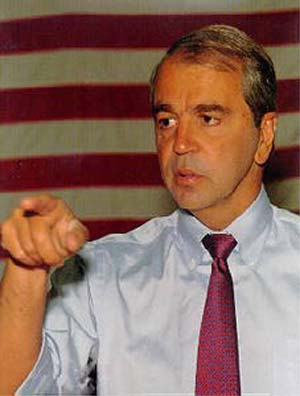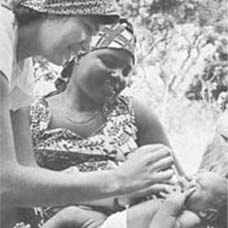
Ethiopia RPCV Paul Tsongas makes politics an art and a science
Paul Tsongas makes politics an art and a science
Guest Column/Eric Saund
Is politics Art or Science? Former US Senator from Massachusetts Paul Tsongas displayed qualities of an accomplished artist and scientist in speaking to an LSC lecture Wednesday evening. For two hours an intelligent and knowledgable individual reasoned about difficult issues. And it was charming. The charm came in witnessing a confident and good-natured personality grappling with tough problems. It was a performance any professor would envy.
Senator Tsongas began by setting a comfortable tone in well-crafted political style, acknowledging MIT's reputation as he joked about the microphone and the chalkboard. The audience became giddy in anticipation and in delight of the senator's detached humor.
With little fanfare the senator proceeded to outline his "keel" theory of the political spectrum. This theory, somewhat resembling the pendulum theory of political sentiment, says that the vast American middle class is fairly comfortable and therefore gravitates away from political extremes toward a (fairly sizable) middle ground.
In judging a political position in any given political era to be left wing, liberal, moderate, conservative or right wing, it is to be viewed with respect to the mainstream of sentiment. The mainstream of opinion shifts around in response to events; thus, for example, an opinion that the defense budget should not be increased was considered moderate at the close of the Vietnam war, liberal during the Iranian hostage crisis, and moderate or even conservative today after several years of the Reagan defense buildup.
Tsongas illustrated his points economically, writing merely the words,"Bella" (Abzug) and "Jesse" (Helms) to denote the left wing and right wing. MIT students appreciate "in" jokes that flatter their intelligence. Through some combination of innate personal style and political instinct developed through years of having to appeal to crowds, the senator latched onto this key. Throughout the evening he left obvious points unstated, or stated the obvious in a pointed way.
When asked whether he thought that an arms agreement would arise from the November summit meeting, he said (quoted roughly), "There are two ways that a major agreement can come out of a summit meeting. First, it can be all planned out in advance by the negotiators and all the leaders have to do is toast for a few days andhe wants this out then sign the document. The second way is for two extremely intelligent and knowledgable statesmen to retreat into the woods and hammer it out, mano a mano, and come up with an agreement that their underlings were unable to [pause]. No arms agreement is being set up for the November meeting." The audience ate it up.
But the senator did not pander. On the contrary, he often ended up at odds with popular liberal thought as he gave honest and reasoned appraisals of a wide variety of issues. While Tsongas is far from a Ruskie-baiter, he emphasized the merits of our open and pluralistic society in contrast to that of the Soviet Union, and he views the Soviet actions in Afghanistan as far more deplorable than recent US misadventures such as Vietnam.
He espoused the virtues of capitalism, and judged that the Democractic party has erred greatly in becoming associated with the view that it is evil to make money.
Tsongas believes that the United States has no business in trying to overthrow the popularly-supported government in Nicaragua. However, he is greatly disappointed in the Sandinista regime. He feels that they squandered an important opportunity to create an example, for other third world nations to follow, of a small country setting a moderate course after a revolution, declining entanglements with either superpower.
The only time Tsongas swallowed before coming straight out with an opinion was when he praised former President Nixon's wisdom in listening to foreign policy advisors who enjoyed a historical intellectual perspective, which resulted in, among other things, the establishment of ties with the People's Republic of China.
In the end, the senator's thorough familiarity with world affairs and the absence of dogma in his assessments appeared to win the audience's respect and admiration. Most of the questions were serious and well-considered, and surprisingly few revealed axes to grind.
Not until the program was over did anyone lose control and yell out their opinion on some issue that the senator had addressed. In the presence of the authority carried by Tsongas' calm, informed reasoning coupled with his sufficient honesty and humility to admit when he just did not know, impasssioned outbursts would have had no place.
Notably, the one article of faith to which Senator Tsongas repeatedly appealed was a fundamental belief in the American democratic tradition. He cited a number of instances in which the body of mainstream political sentiment has acted as a boat keel and tempered the government's unwise actions or brought leaders back in line with American values.
For example, American popular opinion today just will not support US advocacy of a white minority government in South Africa, now that the issue has reached the forefront of American collective consciousness.
But Tsongas, the experienced political participant/observer, appreciates the complexity and subtlety behind seemingly capricious American popular opinion. The situation in the Middle East is bewildering to the average American. Unable to tell the good guys from the bad guys amidst all the violence, he says, Americans adopted an isolationist attitude during the war in Lebanon.
Tsongas' faith in American political democracy fits coherently with his rational beliefs in the openness of American society and in our competitive economic system. And with it all goes an attitude of dispassioned amusement just to make sure that he doesn't take it all too seriously.
There is a certain beauty in watching an artist or scientist at work. They are craftsmen of ideas. They become familiar with a domain of knowledge encompassing facts, skills, beliefs, and faiths, and they work with it, they play with it. They can address problems in their domain. Paul Tsongas showed himself to be such a craftsman of world affairs Wednesday evening. It is heartening to know that such people as him are elected to the United States Senate.
Options: Look at other stories in this issue, send us a comment, or return to our home page.
----
Copyright 1985 by The Tech. All rights reserved.
This story was published on Tuesday, October 8, 1985.
Volume 105, Number 40
The story was printed on page 6.
This article may be freely distributed electronically,
provided it is distributed in its entirety and includes
this notice, but may not be reprinted without the
express written permission of The Tech. Write to
archive@the-tech.mit.edu for additional details.








